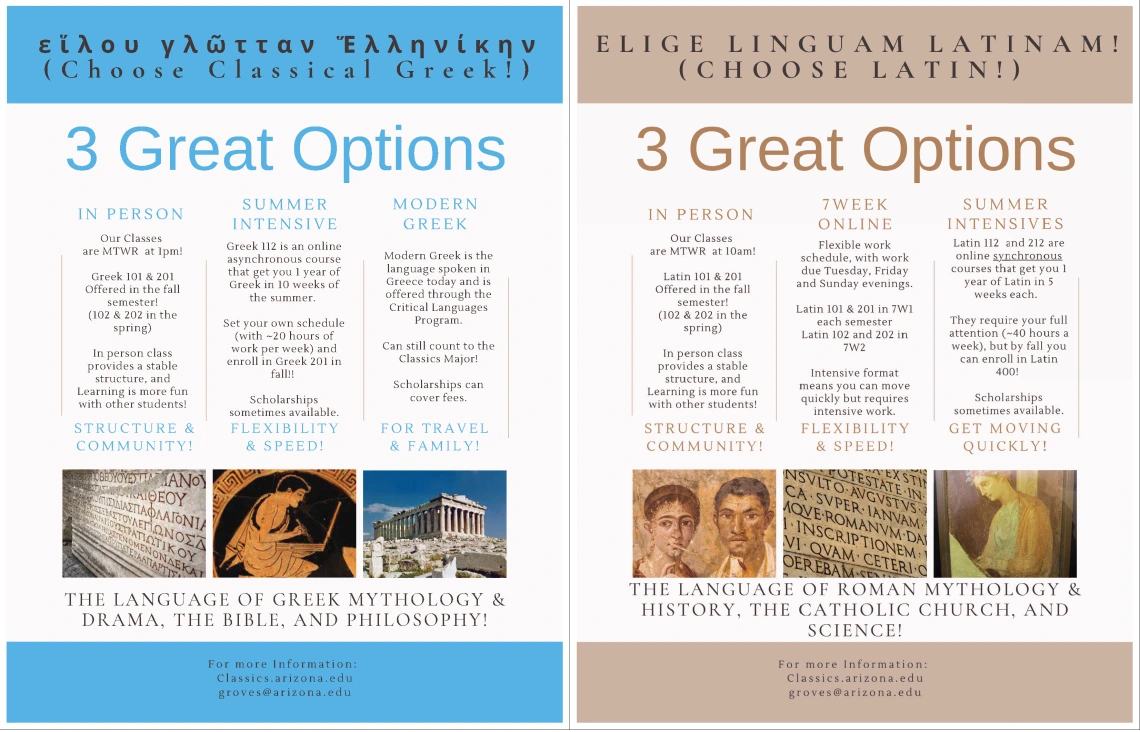Why Greek and Latin?
The study of Ancient Greek and Latin is the foundation of the discipline of Classics. Far from being "dead languages," Greek and Latin are vibrant and fascinating modes of expression that allow readers to engage with beautiful poetry, ever-relevant political and philosophical questions, incendiary rhetoric, and the core works of the European literary canon.
We teach these languages with an eye towards building your ability to read real ancient literature as quickly as is possible. Students are often reading ancient literature like Virgil's Aeneid, Homer's Iliad, and the New Testament of the Bible in their second year of the language! While your friends are still asking each other what they did last weekend, you can be experiencing the beauty and profundity of Ancient Greek and Roman authors for yourself.
There are practical benefits as well! Students who learn Greek and/or Latin develop richer English vocabularies and better understandings of English grammar and syntax. The study of these languages hones critical thinking skills and prepares students for the rigorous work they're likely to need to medical school or law school. It's one of the reasons why graduate admissions committees love to see Greek and Latin on your transcripts!
Questions? Contact the Undergraduate Advisor for Classics.

The Course Sequence
If you've never studied Greek or Latin before, just sign up for GRK 101 or LAT 101! Greek and Latin sequences start in the fall, with GRK and LAT 101 offered every fall and 102 every spring. Likewise in the second year, 201 is offered in the fall and 202 in the spring.
After GRK 202, you can choose any 400- level Greek course offered (at least one per semester). After LAT 202, you can enroll in LAT 400, after which you can enroll in any 400- level course offered (usually 2 per semester). Also, as of Fall 2019, with just one course after Greek 202, you can earn a minor in Ancient Greek!
You can also check out what's on offer right now or soon by checking out our courses for undergraduates and graduates!
Questions? Contact the Undergraduate advisor for Classics.
Summer Intensives
We offer summer intensive versions of both languages as well.
LAT 112 is a 6 credit, 5-week summer intensive course that covers the same material as Latin 101 and 102. LAT 212 is a 6-credit, 5-week summer intensive course that covers the same material as Latin 201 and 202. It's possible to take both LAT 112 and 212 in the same summer, rocketing from no Latin to advanced coursework in less than 3 months!
We also offer GRK 112 every Sumer as a 6-credit, fully online course that covers the same material as GRK 101 and 102. Because the course is fully online and asynchronous, you can work at your own pace, on your own time, from wherever you are, while getting the support you need to succeed! We aren't regularly offering GRK 212, but we hope to be offering it online soon!
For more specific questions including modalities, timing, etc., please look here.
Questions? Contact the Undergraduate Advisor for Classics.
Placement
If you've studies Greek or Latin previously (whether in high school, another college or university, or by yourself), let us know! We'll work with you to determine the best place for you to continue your study of Greek and/or Latin at the University of Arizona! Incoming freshmen and transfer students may take the Latin Placement exam as part of their NextSteps, but a Greek placement is not currently available. For Greek placement, or for any questions or problems, don't hesitate to contact the Undergraduate Advisor or the Director of Basic Latin. You can also reach out to the College of Humanities Advisors!
Modern Greek
Though the Classics department is primarily focused on the teaching of Ancient Greek and Latin, students may also apply their coursework in Modern Greek to our Classical Civilization major! For more information on Modern Greek at the University of Arizona, contact the Critical Languages Program. Support for students of Modern Greek is provided by the Hellenic Cultural Foundation.

